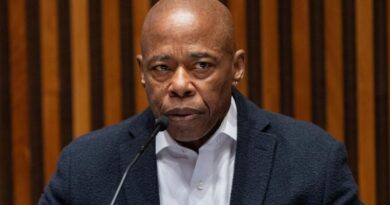Daniel Penny and Luigi Mangione: Divergent Life Journeys, One Emerges as a Hero
Both Daniel Penny and Luigi Mangione were born in 1998, a significant year marked by President Bill Clinton’s impeachment due to the Monica Lewinsky affair, and three years prior to 9/11.
They grew up less than 250 miles apart: Penny in Long Island and Mangione in Towson, Maryland, the only sons in caring families.
Penny is the middle child among three sisters, while Mangione has two younger sisters.
Both became athletic and diligent young men as they matured.
Mangione’s background was more affluent compared to Penny’s, and he achieved greater academic success.
He attended an elite Baltimore prep school that cost his parents $40,000 a year, graduating as valedictorian before earning both bachelor’s and master’s degrees in computer science at the Ivy League University of Pennsylvania, where he focused on creating complex computer games to fulfill his fantasies.
He later worked for several tech companies, most recently serving as a software engineer at California-based TrueCar.
At some point last year, he resigned from that position and began traveling, eventually landing in Honolulu after backpacking through Asia.
He reportedly developed a fondness for Japan, where he spent time earlier this year immersing himself in the culture, akin to a professor studying ants, based on emails that have emerged online.
“The chilling absence of free will in this country,” he noted in one email to an acquaintance, recounting an experience of rescuing a man experiencing a seizure while criticizing the slow response from police who hesitated at red lights despite the urgent situation.
“The contemporary Japanese urban environment doesn’t align well with the needs of human beings,” he expressed.

Similar Independence
Penny grew up in a less affluent environment without the privileges that Mangione had.
He attended West Islip High School, a public school where he excelled in sports, before enlisting in the Marines, where he served as a squadron leader during two overseas deployments.
After four years in the military, he worked for several months at a surf shop close to Camp Lejeune in North Carolina.
He then pursued a college education but found it lacking.
Much like Mangione, he reached a pivotal moment in his mid-20s and chose to travel the globe in search of purpose.
“Growing up in New York, I have always admired ambition and resilience,” Penny remarked.
Penny decided to leave college and backpack through Central America, inspired by the novel Don Quixote, as mentioned in an online job-seeking profile.
“Don Quixote [is] driven by adventure, willingly abandoning his ‘ordinary’ life to chase his dreams despite being deemed a madman… I believe I am meant to serve and engage with the most fascinating and unconventional individuals that the world has to offer.”
Until this year, the paths of these two restless young men were remarkably similar.
Penny excelled in lacrosse at West Islip, while Mangione participated in soccer and track.
They both enjoyed surfing, with Penny in Long Island and Mangione in Hawaii.
Their appearances were even like opposite mirror images, both strikingly handsome with a fondness for longer curly hair—Penny with blond locks and Mangione’s hair brunette.
Friends of both have portrayed them as “people persons.”
However, beyond these parallels, their stories diverge significantly.
One of these all-American 26-year-olds is allegedly a cold-blooded assassin, accused of shooting a man in the back in Midtown Manhattan. The other is a good Samaritan who defended subway passengers from a violent vagrant posing a deadly threat.
Both Mangione and Penny have found themselves entangled in the scrutiny of Manhattan DA Alvin Bragg this year for two tragic and contrasting fatalities within the city.
Both young men perceive themselves in heroic lights.
Yet only Penny embodies the hero.
Penny’s Empathy
Penny should never have faced charges in the death of the violent, drug-influenced Jordan Neely, who threatened passengers on the F train on May 1 last year, prior to Penny, a former Marine, restraining him with a chokehold.
Penny acted out of compassion for the women and children recoiling in fear as Neely, 30, shouted, “I’ll hurt everyone here! I’ll KILL you!!! I don’t care if I go to prison!!!”
Disturbing surveillance footage reveals Neely struggling while Penny and another man held him for seven minutes.
Upon the police’s arrival, Neely was still breathing.
Despite the efforts of a hostile prosecutor labeling Penny as a “white man” and depicting him as a racist, a unanimous jury—predominantly female and including four individuals of color—acquitted Penny this week of charges including criminally negligent homicide.
“I didn’t see a black man threatening passengers,” Penny stated.
“I saw a man threatening passengers, many of whom were people of color… I was scared for myself, but I noticed the women and children. He was shouting at them… I didn’t want to be in that situation, but I couldn’t just stand by and allow him to follow through on those threats.”
In an interview with Fox News’ Judge Jeanine Pirro, Penny asserted, “I am willing to endure a million court appearances and face name-calling and hatred, just to prevent one of those individuals from being harmed or killed.”
If he is guilty of the murder of UnitedHealthcare CEO Brian Thompson, 50, Mangione is no hero.
The individual who approached Thompson from behind in the early hours of December 4 and coolly shot three bullets into his back is a psychopath.
The unsettling surveillance footage captures Thompson walking intentionally down West 54th Street towards the Hilton on Sixth Avenue, where he was scheduled to give a conference speech.
This would mark the final journey for the 50-year-old father of two, who emerged from a working-class background in rural Iowa, the son of a beautician and a grain elevator operator.
He graduated from South Hamilton High School in Iowa—where he was class president and homecoming king—before becoming valedictorian in 1993, just as Mangione was.
The last moments of his life on that cold morning were recorded in grainy video captured by street corner cameras.
The footage shows the gunman stepping from the shadows, donned in a black hoodie, calmly aiming his weapon at Thompson’s back.
CEO’s Vicious Killing
Thompson staggers, then wobbles to his right, clutching at the wall and looking back in disbelief at the gunman, who remains calm as he reloads and fires a second shot while moving closer to his victim.
You can glimpse the rapid shift of Thompson’s expression just before he is spun around, taking a few faltering steps before collapsing onto the sidewalk.
The gunman fires a third shot as Thompson drops, then briskly walks toward his downed target.
But Thompson is no longer moving.
The shooter diverts across the street.
His grim real-life game has unfolded precisely as he intended.
The words etched on the deadly bullets, “deny,” “defend,” “depose,” reference the tactics allegedly employed by insurance firms to evade claims.
They serve primarily to glorify him and provide a false narrative of being a gallant avenger.
When Mangione was apprehended on Monday at a McDonald’s in Altoona, Pennsylvania, police reportedly uncovered a rambling “manifesto” presenting him as a “hero” who did what “had to be done” because healthcare executives like Thompson are “parasites” who harm Americans.
The words betray a life steeped in narcissism and delusions of grandeur.
They are another transparent attempt to portray the premeditated murder of Thompson as a noble act.
Yet, it is Mangione who has garnered a following online, idolized by individuals exhibiting the same psychopathy and lack of empathy as their troubled anti-hero.
This reflects a society that has lost its ethical bearings—where Mangione elicits admiration while brave Penny is condemned as a “white vigilante.”
This truth should be self-evident: Cold-blooded murder is reprehensible.
Risking one’s life to protect vulnerable strangers from a violent predator is commendable.



